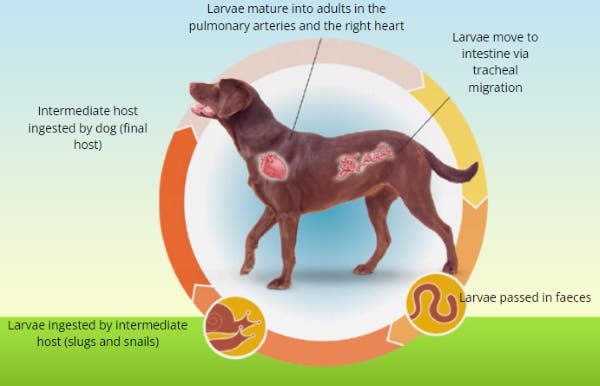What is lungworm in pets?
Lungworm is a parasite that lives in the heart and blood vessels of infected animals. There are lots of different types of lungworm, but one in particular that affects dogs (called Angiostrongylus vasorum) can be fatal if left untreated. However, it’s a common misconception that only dogs get lungworm – cats can get their own type of lungworm too!
The larval stages of these specific parasites are carried by slugs and snails; if these are eaten by pets, the larvae enter the bloodstream before maturing into hair-shaped adult worms 5-12 mm long. The parasite can be potentially life-threatening for dogs if it is not treated early on.

Lungworm Factoid!
Lungworm is considered to be an ‘emerging’ disease in the UK and may be linked to climatic changes.
Animals at risk of lungworms include:

The symptoms of lungworms
Lungworm damages airways and blood vessels, so symptoms may include respiratory issues or more general signs:
- coughing
- bleeding – from the nose, eye or more than usual from a minor cut or wound
- anaemia (paleness around the eyes and gums)
- tiring easily or lethargy
- depression
- weight loss
- poor appetite
- vomiting
- diarrhoea

Lifecycle and stages of lungworms

Infection stages: Depending on the type of lungworm picked up, it can take from a few weeks to several months for a dog to exhibit signs of infection.

Risks of lungworms to humans
Luckily for us, lungworm is not transferable to humans, but it can be deadly for our dogs.
Spread of lungworms in Europe
Lungworm first emerged in France but has since spread right across Europe.

How to get rid of lungworms in pets
Prevention is definitely better than a cure: prevention must be monthly and can only be prescribed by your vet; worming every three months will not prevent lungworm. Always speak to your vet, as not all wormers are effective against this particular parasite.
If you have concerns that your pet may have picked up lungworm, consult your vet as soon as you can. Most pets with lungworm make a full recovery if they are treated quickly. If left however, more complicated secondary infections can occur such as pneumonia.
Lungworm has spread throughout the UK in recent years, and can be fatal to dogs; use this online lungworm locator to check if it’s been reported in your area and speak to your vet about a monthly lungworm prevention plan.
Find out more about other worms in pets
This information was provided to you by Elanco Animal Health makers of Milbemax™.
Information regarding the side effects, precautions, warnings and contra-indications can be found in product packaging and leaflets; further information can also be found in the Summary of Product Characteristics. Use medicines responsibly (UK). Advice should be sought from the prescriber prior to use. Prescription decisions are for the person issuing the prescription alone.
Milbemax™, Elanco™ and the diagonal bar logo are trademarks of Elanco or its affiliates.
